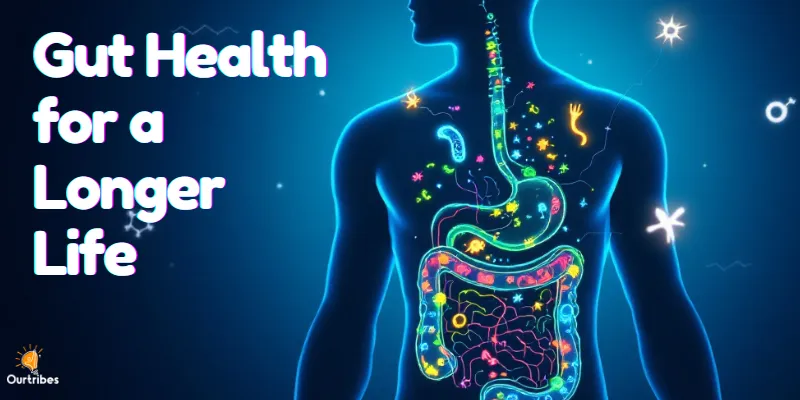
Gut Health for a Longer Life
Unveiling the Secrets of Gut Health for a Longer Life
In our quest for longevity, the gut microbiome plays a pivotal role in determining our health and lifespan. Recent research has identified four key bacteria that are prevalent in super-agers, those who live to be over a hundred. This blog explores how nurturing these beneficial bacteria through diet can lead to a healthier, longer life.
Introduction to Longevity
Longevity has fascinated humanity for centuries. The quest to understand how some individuals live well into their hundreds has led to extensive research across various fields. This exploration isn’t just about adding years to life but ensuring those years are lived in good health. From genetics to lifestyle choices, multiple factors contribute to longevity, with emerging studies highlighting the significance of the gut microbiome.
The Role of Blood Vessels in Disease and Aging
Blood vessels play a critical role in our overall health and aging process. They are the lifelines of our body, delivering essential nutrients and oxygen to every cell. However, when blood vessels become compromised, it can lead to a cascade of health issues, including heart disease, diabetes, and even cognitive decline. Understanding the health of our blood vessels is essential as they connect various organ systems, influencing everything from inflammation to nutrient absorption.
Exploring the Impact of Blue Zones on Longevity
Blue Zones are regions of the world where people consistently live longer, healthier lives. Researchers have identified common lifestyle characteristics in these areas, such as plant-based diets, regular physical activity, strong community ties, and a sense of purpose. These factors create an environment that fosters longevity. By studying these communities, we can uncover valuable insights into how lifestyle choices influence our lifespan and health span.
Understanding the Connection Between Oral Health and Dementia
Recent studies have revealed a surprising connection between oral health and cognitive decline. Poor oral hygiene and gum disease may significantly increase the risk of developing dementia. Bacteria from the mouth can enter the bloodstream, potentially affecting brain health. Maintaining good oral hygiene not only benefits dental health but may also play a crucial role in protecting cognitive function as we age.
Alzheimer's Research and Gut Health Connection
The relationship between gut health and Alzheimer's disease is becoming a focal point in research. Emerging evidence suggests that the gut microbiome may influence the development and progression of neurodegenerative diseases. Specific bacteria in the gut can affect inflammation and immune responses, both of which are crucial in the context of Alzheimer's. Understanding this connection could pave the way for new preventative strategies and therapies.
The Secret to Longevity: Gut Microbiome of Centenarians
Centenarians, those who live to be 100 years or older, often have unique gut microbiomes that set them apart from younger populations. Research has identified specific bacteria that are prevalent in these individuals, indicating a potential link between gut health and longevity. These beneficial bacteria may enhance metabolism, reduce inflammation, and support overall health, highlighting the importance of nurturing our gut microbiome as we age.
How Your Gut Microbiome Influences Your Health
Your gut microbiome is a complex ecosystem of trillions of microorganisms that play a vital role in your health. It influences digestion, immunity, and even mental health. The foods you consume directly affect the diversity and composition of these microbial communities, making dietary choices crucial for maintaining a healthy gut. A balanced diet rich in fiber, fermented foods, and prebiotics can promote the growth of beneficial bacteria, supporting overall well-being.
Role of Oxytocin and Gut Bacteria in Human Physiology
Oxytocin, often referred to as the "love hormone," is not only crucial for social bonding but also has significant implications for health. Recent research suggests that certain gut bacteria can stimulate the production of oxytocin, linking gut health to emotional well-being. This connection underscores the intricate relationship between our gut microbiome and various physiological processes, including stress response and emotional regulation. By fostering a healthy gut, we may enhance our emotional resilience and overall health.
Understanding the Role of Gut Health in Disease Prevention
Gut health is increasingly recognized as a cornerstone of overall health and disease prevention. Research shows that the gut microbiome influences a wide array of conditions, from metabolic disorders to autoimmune diseases. The gut acts as a barrier, regulating what enters the bloodstream and playing a significant role in immune function.
When the gut microbiome is healthy, it can effectively manage inflammation and support the immune system. Conversely, an imbalanced microbiome can lead to chronic inflammation, which is linked to various diseases, including diabetes, heart disease, and even certain cancers. The key to harnessing gut health for disease prevention lies in nurturing beneficial bacteria through dietary choices.
Gut Health and Longevity: Unraveling the Connection
The connection between gut health and longevity is a growing area of interest. Studies suggest that a diverse gut microbiome can promote healthier aging by reducing the risk of chronic diseases. For instance, individuals with a higher abundance of beneficial bacteria tend to experience lower levels of inflammation, which is a common factor in age-related diseases.
Moreover, certain gut bacteria are involved in the production of short-chain fatty acids (SCFAs), which have protective effects on the body. SCFAs can enhance gut barrier function, reduce inflammation, and even influence brain health. This emphasizes the importance of maintaining a balanced diet rich in fiber to support the growth of these beneficial bacteria.
Embracing Longevity and Living in the Moment
While the pursuit of longevity is essential, it's equally important to embrace the present moment. Focusing solely on extending life can lead to anxiety and stress. Instead, cultivating a lifestyle that emphasizes well-being today can lead to a longer, healthier life.
Practices such as mindfulness, gratitude, and social connections can enhance mental well-being, contributing to overall health. By living in the moment and making conscious choices, individuals can find joy in their daily lives while also supporting their journey toward longevity.
Understanding Processed vs. Ultra-Processed Foods
Food processing exists on a spectrum, with minimally processed foods at one end and ultra-processed foods at the other. Minimally processed foods include items like frozen vegetables or canned beans, which retain their nutritional value. In contrast, ultra-processed foods are typically high in sugar, unhealthy fats, and artificial additives.
These ultra-processed foods often lack essential nutrients and can disrupt gut health. They tend to promote inflammation and alter the gut microbiome negatively. Understanding this distinction is crucial for making informed dietary choices that support gut health and overall well-being.
Impact of Microplastics and Ultra-Processed Foods
The concern surrounding microplastics is increasingly relevant in discussions about food quality and health. Microplastics can enter the food supply through various channels, including processed foods. Studies suggest that these tiny particles may have detrimental effects on gut health and overall physiological function.
When combined with ultra-processed foods, the potential health risks multiply. The additives and preservatives in these foods may interact with microplastics, exacerbating their harmful effects. Therefore, opting for whole, minimally processed foods can help mitigate exposure to both ultra-processed ingredients and microplastics.
Benefits of Whole Foods on Gut Health
Whole foods are packed with nutrients, fiber, and bioactive compounds that support gut health. Foods such as fruits, vegetables, whole grains, nuts, and seeds provide the necessary building blocks for a thriving gut microbiome. The fiber in these foods serves as fuel for beneficial gut bacteria, promoting their growth and activity.
Moreover, whole foods are rich in polyphenols, which have antioxidant properties and can enhance gut barrier function. Regular consumption of whole foods not only contributes to better gut health but also supports overall physical and mental well-being.
Health Impact of Smoking and Environmental Toxins
Smoking and exposure to environmental toxins can severely impact gut health. The chemicals in cigarettes and other forms of inhaled smoke can disrupt the gut microbiome, leading to inflammation and increased permeability. This can pave the way for a host of health issues, including gastrointestinal disorders and chronic diseases.
Additionally, environmental toxins from pollutants can have a cumulative effect on health. Reducing exposure to these toxins through lifestyle choices and dietary adjustments can significantly benefit gut health and overall resilience against disease.
Understanding Hunger and Satisfaction: The Clicker Concept
Understanding the difference between hunger and satisfaction is key to developing a healthy relationship with food. Many individuals eat based on external cues rather than internal signals of hunger. The "clicker concept" posits that if we eat slowly and mindfully, we can better attune ourselves to our body's natural cues.
By focusing on whole foods, which are more satisfying due to their fiber content, individuals can learn to recognize when they are satisfied rather than full. This approach not only promotes healthier eating habits but also supports gut health by reducing the likelihood of overeating.
Simple Steps to Begin Your Healing Journey
Embarking on a healing journey doesn’t have to be overwhelming. Start with simple, actionable steps that fit seamlessly into your daily routine. First, consider skipping a meal a few times a week. This doesn’t require meticulous planning or strict schedules; it simply means extending your fasting period. For many, skipping breakfast is the easiest option. By doing so, you can allow your body to tap into its natural healing mechanisms.
Next, incorporate movement into your day. A brisk walk after dinner can be transformative. Walking not only aids digestion but also enhances mood and overall health. Whether you walk alone, with a friend, or while listening to a podcast, this simple activity can significantly contribute to your well-being.
Lastly, prioritize quality sleep. Sleep is when your body repairs itself, and the glymphatic system, a unique waste clearance system in the brain, is activated. Ensuring you get adequate rest will help your body regenerate and maintain cognitive function.
Understanding the Glymphatic System: Brain's Hidden Sewer
The glymphatic system is an essential yet often overlooked component of brain health. This system works during sleep to eliminate toxins and waste products that accumulate in the brain throughout the day. When you sleep, the glymphatic system opens up, allowing for the flushing out of harmful substances, including those that contribute to neurodegenerative diseases.
By prioritizing sleep, you are not just resting; you are enabling your brain to detoxify. Poor sleep can lead to cognitive decline, brain fog, and a myriad of other issues. Understanding and nurturing this system can have profound implications for your long-term health.
Understanding Gut Health for Longevity
Gut health is integral to overall well-being and longevity. A healthy gut microbiome supports digestion, immunity, and even mental health. The foods we consume play a pivotal role in shaping our gut microbiota. By choosing a diet rich in fiber, prebiotics, and fermented foods, we can foster a thriving gut environment.
Moreover, a diverse gut microbiome is linked to reduced inflammation and a lower risk of chronic diseases. Emphasizing whole, minimally processed foods helps maintain this diversity, ensuring that our gut health supports our longevity journey.
Discoveries in Medical Science
Recent advancements in medical science are revealing the complexities of our bodies and the interconnectedness of various systems. Researchers are uncovering new insights about the gut-brain axis, illustrating how gut health affects mental well-being and vice versa. This two-way communication highlights the importance of nurturing both our gut and mental health for optimal longevity.
Additionally, studies are beginning to explore the impact of certain medications on gut health. While some may disrupt the microbiome, others, like metformin, show promise in promoting a healthy gut environment. These discoveries could pave the way for more personalized approaches to health and longevity.
Importance of Gut-Brain Connection for Longevity
The gut-brain connection is an essential aspect of health that is gaining attention in longevity research. This relationship emphasizes how our digestive health can influence our mental state, and conversely, how our mental health can affect gut function. Stress, anxiety, and depression can lead to digestive issues, while a healthy gut can enhance mood and cognitive function.
Recognizing this connection encourages a holistic approach to health. By addressing both gut and brain health, we can create a more balanced lifestyle that supports longevity and enhances quality of life.
Benefits of Lactobacillus Reuteri and Probiotics
Lactobacillus reuteri is a beneficial bacteria that plays a significant role in gut health. This strain has been linked to improved immune function, reduced inflammation, and enhanced metabolism. Incorporating foods rich in Lactobacillus reuteri, such as yogurt and certain cheeses, can help support a healthy microbiome.
Probiotics, in general, are essential for maintaining gut health. They help balance the gut microbiota, improve digestion, and may even protect against certain diseases. Regularly consuming probiotics can be a simple yet effective way to enhance overall health and longevity.
Combating Misinformation in Health Advice
In today’s information age, distinguishing between accurate health advice and misinformation is crucial. The abundance of conflicting information can lead to confusion and poor health choices. It’s essential to rely on credible sources and scientific evidence when making health decisions.
Stay informed by following trusted health professionals and reviewing reputable research. This approach will empower you to make informed choices that support your journey toward longevity.

© 2024 OurTribes. All rights reserved.




